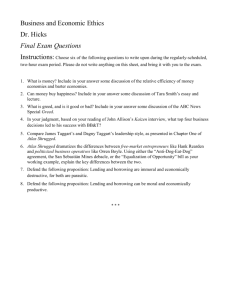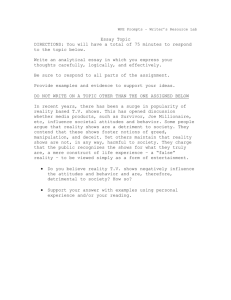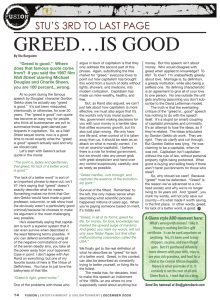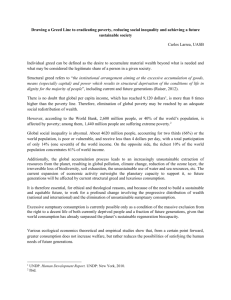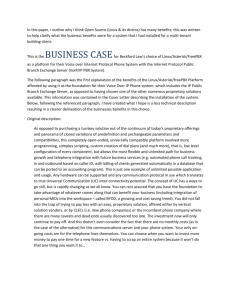The Greed Creed
advertisement
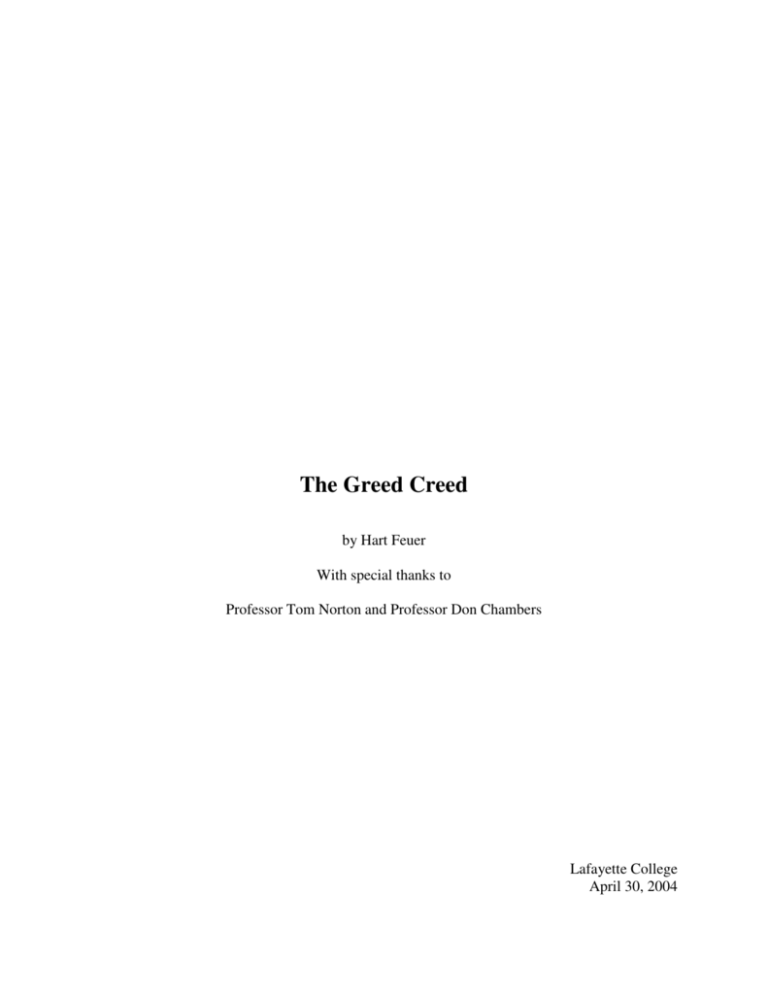
The Greed Creed by Hart Feuer With special thanks to Professor Tom Norton and Professor Don Chambers Lafayette College April 30, 2004 “You show me a capitalist, and I'll show you a bloodsucker” – Malcolm X Many argue that the greed has become something of an accepted and almost endeared tenet of American business behavior. For them, greed is seen as one of the strongest motivational influences of our time. In movies such as Wall Street, among other media, this position has been glorified and encouraged. Objectivist writers such as Ayn Rand appear to give the position a philosophical dimension, vehemently espousing self-interest and capitalism. For others, greed takes on much more sinister shades. Ethicists such as Immanuel Kant often denounce all self-interest as immoral; psychologists deny the connection between more money and more happiness; and crime is increasingly being blamed on the inequality resulting from greed. A mother scolds her child for being “greedy,” Alan Greenspan scolds America’s large business world for its “infectious” greed, and the dictionary reminds us that greed is excessive and reprehensible. In this ever more complex tangle of contradicting philosophers, public officials, role models, and media portrayals, how does one interpret the influence of greed in our society? In this essay, I will portray how, as the degree of self-interest guiding an individual’s behavior increases, the sustainability of his or her actions on the economy and world, the overall well-being of the him or herself and the community, and the morality of the individual are increasingly disparaged. Redefining Self-Interest and Greed “Many […] attach to competition the stigma of selfish greed” - Henry Fawcett 1 Self-Interest Acting in the interest of oneself is an integral and beneficial feature of market capitalism. Because one is directly rewarded by self-interest-driven behavior, it motivates individuals to work harder, be more inventive, and to strive for the highest profit. In the interactions amongst consumers and producers, it is also the fundamental drive that allows the market to interpret and consolidate the overload of data about peoples’ preferences into one understandable figure: the price. A consumer makes a self-interested purchasing decision based on personal and environmental factors of his or her budget. The social cooperation that results when people make their individual choices on a large scale is referred to as the free market (Lee). Markets, and more specifically, prices, allow for an effective, if superficial, exchange of information among the world populations. Behind the price of an avocado, for instance, exists a wealth of information, describing the weather and crop success in avocado-producing areas, the cost to pay farmers and transporters, the mark-up the grocery store must charge to remain in business and/or profit, and how much avocadoes are valued by consumers as a whole. By choosing to pay an inflated price for avocadoes, the consumer declares his or her desire to, perhaps, compensate farmers who were stricken with a poor season. In this way, prices streamline the delivery of information and allow the buyer to make the decision. The choice to purchase organic, non-organic, local, imported, name brand, or generic collectively imparts enough information to producers to help them guide supply. Without markets, one would have to relay to the producers directly that their preferences have or have not been catered to. However, prices do not perfectly transmit information, but they do function admirably well, and are still the best avenue that we have seen thus far for organizing complex markets. 2 Ideally, market prices allow people to respond as if they are as concerned with the interests of others as they are with their own, without actually knowing it (Lee). A consumer does not know that he or she is purchasing from a company who pollutes the environment, or one that stewards the environment; in the ideal sense, the consumer’s judgment is based on the quality and price of the product. Therefore, paying market prices is an act of self-interest that is, for the most part, morally neutral1. Fred Hirsch, author of Social Limits to Growth, may even regard such acts as positive, because they contribute to an economy where an individual is allowed to make honest decisions based on his or her faith that the prices legitimately reflect the market conditions (Hirsch 141). Greed If greed meant actively and passionately pursuing one's self-interest, then it would function as a normal contributor to capitalist society. However, greed typically has more serious consequences and sometimes involves going beyond honest initiative (Skousen). Merriam and Webster define greed as an "excessive or reprehensible acquisitiveness; avarice." Through the word avarice, it is clear that greed is often associated with monetary gain. Through the words excessive and reprehensible it is clear that the effect is negative. Yet, many Americans almost crack a sardonic grin when they hear the word greed, declaring that, naturally, greed is what drives the economy. Adam Smith would disagree with this judgment, and would probably even roll in his grave to hear the word greed be used to describe an economy built out of his influences. While 1 In some cases, the consumer has more knowledge about the production and processes surrounding the purchase in question, but this is, by and large, not the case. 3 Smith was a clear supporter of the idea that the public benefits through the pursuing of one’s private self-interest, he was very critical of greed’s effect. He disapproved of gain if the process entails defrauding another or engaging in dishonest behavior. In fact, he strongly believed that “[an entrepreneur] will be more likely to prevail if he can interest [competitors’] self-love in his favour” (Smith 14). A free market society, according to Adam Smith, moderates passions and prevents economic and moral degradation. In his research about the period of Enlightenment, Charles de Montesquieu maintained that commercial activity actually restrains greed. The process by which a society channels its energy into commerce, through frugality, moderation, and order acts as a shield against violence and abuses of political and economic power: “It polishes and softens barbarous mores […] The natural effect of commerce is to lead to peace.” Through education and self-discipline, one can become lawfully industrious and avoid negligence (Montesquieu 338). From a classical perspective, at the very least, the overly passionate motivations of greed are looked upon negatively. The Separation Between Self-Interest and Greed I assert that, relative to greed, self-interest is a less destructive and/or neutral force. Many ethicists and sociologists tend to label self-interest as immoral, defaming it as the ugly result of a socially apathetic society. Immanuel Kant would say that a self-interested decision contains an underlying motive that is not moral. Emile Durkheim would remark that efficient social cooperation cannot be achieved simply through self-interest. He challenges the ideal of an economy run through the collective decision-making of self-interested individuals. However, 4 both he and Kant stand together against the idea of a greed-run economy. Greed, Durkheim declares: “…is aroused without knowing where to find the ultimate foothold. Nothing can calm it, since its goal is far beyond all it can attain. Reality seems valueless by comparison with the dreams of fevered imaginations; reality is therefore abandoned.” Although he is critical of self-interest, Durkheim concedes that greed is a significantly more powerful and destructive influence. It requires acting with far less restraint, the results of which are harder to control and interfere with others’ relatively restrained endeavors (Norton, discussion). In making the separation between these two forces, Durkheim illuminates the position to which Kant has ascribed—namely, that while self-interest may be morally reproachable in some situations, greed is the profoundly negative influence here. Greed Fosters Inequality and Fails to Foster Happiness “I have news for the forces of greed and the defenders of the status quo: your time has come – and gone. It’s time for change in America.” – Bill Clinton A professor of economics and business at Lafayette College is fond of pointing out that “we all prefer more wealth to less wealth.”2 This begs the question of whether an individual actually benefits from that preference. Further, does the desire for more wealth diminish as more 2 This is a favorite quip of Donald Chambers, which was used at the McKelvy Scholar discussion on October 19, 2003. 5 wealth is obtained? And is this desire for wealth spurred on by something independent of the amount of wealth we have? Research conducted by psychologists Deci and Ryan (2001) concerning the effects of money on well-being has shown that, for families living above the poverty line, an increase in personal wealth does not bring increased happiness. They also show that the more one focuses on financial matters, the lower his or her happiness is. Even those who claimed that money brought them happiness did not become happier with an increase to their personal wealth. It appears that we believe that more wealth will increase our happiness, when it, in fact, does not. This means that the motivation behind greed—the excessive pursuit of material wealth—is based on a false perception: that it can bring about greater happiness. Rational individuals will partially recognize the limitations of greed. We can assume that some other egoistic motivation drives the individual to increase his or her personal wealth—be it luxury items, prestige, feelings of domination, or some superficial need for the accumulation of currency. These desires are normally deemed to be good for the economy. They drive people to work harder and be more innovative. This positive byproduct is, however, only a potential result. What is guaranteed, on the other hand, is that an individual exists out there surviving below the poverty line that would certainly benefit more, in terms of happiness, from an increase in personal wealth than would the greed-driven and affluent individual. When this happens on a national scale, the prosperity gap between the rich and the poor widens. As it widens, the poorer end of the spectrum witnesses a decrease in the overall opportunity to be a productive contribution to the economy; there is simply less money available to be earned (Norton, discussion). This handicaps the lower class, preventing workers and families from having the same opportunity to advance. While a few 6 people may certainly rise above this handicap, the difficulty thereof discourages other qualified individuals who would have advanced under different conditions. The long term result of the greedy accumulations of wealth is, as Montesquieu predicted, very negative. The shield against violence and corruption held there by moderation and order is compromised, allowing the society to slip into unlawfulness. With the widening prosperity gap, more and more people become frustrated, find themselves without productive uses for their time, and resort to crime. It has been shown that states with greater inequality in the distribution of income have higher rates of unemployment and higher rates of incarceration (Kaplan et al.). Historically, this type of prosperity gap continues to widen and conditions continue to worsen until a revolution finally erupts. Greed, which naturally fosters the accumulation of wealth on one end of the social spectrum, is therefore unsustainable over a very long time horizon. In American business history, pro-greed mentality usually precedes revulsion with it as business leaders go from glamorized to demonized, and desires to deregulate yield to cries for reform (James). Greed’s Positive Motivational Influences vs. Its Negative Operational Effects For those who perceive that self-interest in the economic sense is not capable of competing in modern markets and has not achieved adequate strides in innovation or productivity, it seems natural to look to greed as the stronger motivational force. Greed will get the job done: sluggish self-interest will not. Greed will inspire pioneering companies like Enron, WorldCom, and Global Crossings to develop revolutionary systems to market energy and technology. Greed has also brought them to dishonesty and resulted in catastrophic behavior. In 7 light of such events, we are forced to weigh the potential benefits of greed more thoroughly. Was the immense potential for innovation brought to the table by these companies worth the following debacle? Is the risk inherent to such greed-driven entrepreneurship more than the risk inherent to self-interest? And if it is higher, is the probability of the endeavor bearing fruit worth that added risk? With complete information concerning the risk involved, one would treat companies driven by greed more cautiously than those driven by self-interest. Without full information, as is the norm, companies practicing questionable behavior in order to gain an advantage are allowed to masquerade as regular companies. In order to remain competitive, other companies may be pressured to adopt those practices. On a smaller scale, as within a business, co-workers are obliged to follow the lead of their bosses and colleagues. Alan Greenspan appropriately denounced greed as “infectious” and delivered a warning that the growing occurrence of corporate accounting malfeasance and irresponsibility were a threat to the U.S. recovery from the recession of 2000. In some contexts, self-interest can be a powerful and positive motivation force. The scientist who eventually discovers the cure for HIV may have been originally impassioned when her mother was diagnosed with the virus. Although millions would benefit from the discovery, the scientist was primarily interested in curing her mother. I would argue that the positive externalities, or the benefits derived by the victims of HIV/AIDS, would outweigh the moral hazard of being inspired only by the mother’s plight. Furthermore, the empathic connection between the scientist and her mother can be seen as a practical replacement for feeling sympathy for all of the victims worldwide. This holistic sympathy is an intangible and abstract humanitarian notion that may be difficulty to draw inspiration from. Allowing the scientist to be 8 seen as morally neutral or morally correct in focusing on her mother’s condition is the efficient result of self-interested motivation. To understand the effect of a greed-driven motivational process, we can look at alternative outcomes of the scientist’s behavior. Wishing to hasten the process, she may have taken a few liberties with the research process: experimenting on humans, stealing research, or inflating progress to obtain more funding. Had the scientist’s mother died during the research process, the greed-driven scientist would have lost her motivation to continue work and would have abandoned the work. Although one cure (albeit a significant one) is found, the scientist endangered the credibility of scientists worldwide in the process and may have wrought more damage on the profession as a whole than is even justifiable by an HIV cure. Most greed-driven innovation, however, is directed at endeavors that provide more profit—that is, the greed is based on monetary accumulation. A more likely outcome of the above scenario is as follows: the scientist who would have discovered the cure for HIV was led astray by the more profitable field of paperclip production. Unfortunately, requiting the direst needs of people and society is not necessarily profitable. This does not represent a failure of market incentives and prices, but reflects the coincidental makeup of the market. A scientist is not guaranteed to find the cure and to reap a large monetary and social profit, but she may be guaranteed a good salary in the paperclip market. The direct and indirect effects of greed are difficult to track, which provides an opportunity for to assess it overly optimistically. Returning to the previous example, the loss of one HIV-cure researcher (due to insufficient monetary reward) may not be significant, but if greed is as ubiquitous as many claim, there could be (or has already been) an exodus of skilled researchers out of socially necessary but unprofitable fields. Also significant, the presence of 9 one greed-driven scientist among other researchers, as I have shown, can have a negative impact on the entire profession. At the very least, the possibility of such occurrences is increased by the influence of greed. On the other hand, many of the seemingly positive effects of greed are not visible. From a utilitarian point of view, the benefits of greed may very well be outweighing the costs of greed as a whole. I believe this judgment breaks apart when any number of the following conditions are met: (a) a longer time horizon to determine the effects is used (b) the effect is looked upon from a social or humanitarian perspective (c) corollary effects are evaluated (such as setting a dishonest precedent in a business setting or being a role model for future greedy behavior). Objectivism Stresses Rational Self-Interest “I swear, by my life and my love of it, that I will never live for the sake of another man, nor ask another man to live for mine.” – John Galt in Ayn Rand’s Atlas Shrugged Many people see Objectivists manifested in the form of political republicans, who see greed as good and worship the individual above all. E.G. Ross, Nathaniel Branden, and Ayn Rand have given to many a theoretical and philosophical basis for greed and its inspired influence on humankind. While it is true that Objectivism is based on self-interest, its tenets are actually at odds with the overly strong influence of greed (Katz). The primary ideas of Objectivism, as interpreted by Raymie Stat, are: Reason is man’s only means of knowledge 10 Rational self-interest is the objective ethical code Laissez-faire capitalism is the objective social system Interpreted from the perspective of the individual, greed is the ceaseless desire for the accumulation of something (such as money). The basis for one’s desires become blurred by the irrationality of the motivation. To use the words of Durkheim again, one is impelled to continue accumulating without a compelling reason to do so. The rational self-interest sought after by Objectivists would lose its rational component. Being that Objectivists focus on the individual, and the individual, in this case, is not aware of his or her contribution to an economic endeavor, Objectivism would deny the rationality of such behavior. To use a familiar example; imagine the brilliant scientist who loves her field yet chooses to enter the paperclip industry. She was capable of providing a higher order of benefit to herself and society, and understood her capabilities quite well, but was instead inhibited by the profit to be made in the already wellestablished paperclip industry. The guarantee for profit is certainly a rational motivator, but giving up the opportunity for potential wealth, fame, and enjoyment of work is an irrational motivation. Being that Objectivism stresses laissez-faire capitalism, the inevitable order of the economy would be mass specialization, since it is the most efficient economic equilibrium (Read). When a scientist disposed to specialize in HIV research chooses to pursue paperclip production, their post as a specialist will be much more difficult to replace than the relatively simple position as a manager in a paperclip plant. Specialization, in this case, is not achieved and an Objectivist would declare the behavior of this person as unreasonable and irrational. 11 As the scope of a entrepreneurial venture changes from small business to corporation, it takes on a new and more machine-like identity that lacks the level of liability, perspective, and lacks the associated constraints of a human. The concept of self-interest is skewed by this formation, giving certain individuals a dangerous combination of power, self-interest, and immunity that raises the risk of dishonest initiative. The presence of power and immunity are critical in understanding why and how self-interest turns to greed. The influence of these two forces alter the rational nature of self-interest, the result of which making, greed, is then incongruent with Objectivist theory. “Greed is Good” — Out of Style “Greed, for lack of a better word, is good. Greed is right, greed works. Greed clarifies, cuts through, and captures the essence of the evolutionary spirit. Greed, in all of its forms: greed for life, for money, for knowledge has marked the upward surge of mankind.” -- Gordon Gekko, Wall Street, 1987 Before the Enron scandal landed a devastating blow to the integrity of the U.S. business community in November of 2001, greed had been—with minor criticisms—on a proverbial cultural pedestal; it described what has brought America to its position of economic power and what would keep it there. It was revered in such a way, that to undermine it was to undermine the foundations of the country. The movie Wall Street glorified greed so effectively, that the concept gained somewhat of a cult following in economic circles.. Ivan Boesky was hailed during the 1985 commencement speech at the University of California-Berkeley's School of 12 Business Administration for saying “Greed is all right, by the way I think greed is healthy. You can be greedy and still feel good about yourself.” The sentiment was present in business circles and academic circles alike throughout the 80’s and began manifesting itself in business practices in the 90’s. For Ivan Boesky, that bubble burst when he was convicted of conspiring to file false documents with the federal government, involving insider trading violations (The Columbia). For the business community at large, that bubble was burst in 2001 with the large corporate malfeasance scandals. The movie Wall Street portrayed a clear, if only anecdotal, case study of why greed may culminate in such incidents The character Gordon Gekko (Michael Douglass) is a highly successful and revered superbroker specializing in hostile takeovers while Bud Fox (Charlie Sheen) is an ambitious and honest stockbroker. Viewing Gekko as a route to success, Bud Fox becomes his protégé and immediately begins surpassing his previous performance. Although Bud Fox is very competitive, he ultimately lacks the ruthlessness, egotism, and dishonesty of Gordon Gekko to follow through with the destruction of Blue Star airlines. The behavioral patterns of both Gekko and Fox illustrated some of the side-effects of greedy behavior: cheating (inside trading), ethical degradation (a loss in family values), and selfdefeating behavior (Fox’s addiction to greed-induced success). Although pop-culture may have advanced Gordon Gekko’s famous bad-boy quote (see above) into the annals of infamy, the moral of the movie was clearly that greed is corrupting and bad. Our mothers’ could have told us that years ago, right? And they certainly did so—but something of an ethical change in the 80’s and 90’s glorified greed and ruthless business practices. Although many were aware of this pervasive influence and broached the subject, such as Bill Clinton (see quote above) and the movie Wall Street, the popular mystique surrounding 13 greed and the precedents of the business world were not to be dislodged. The Security and Exchange Commission should have expected the accounting scandals of our time. They are the likely culmination of many years of greed-driven motivation. Greed Is Culturally Isolated Although greedy behavior may not be typical of only Americans, it is surely not a universal motivation. Even with America, greed manifests itself different depending on a host of different factors, including the age of the person, their level of affluence, upbringing, and field of work. Business professionals, for instance, are more likely to be guilty of greedy practices because their access to power and influence create a haven for such behavior. On the other hand, many cultures have ingrained values that forbid behavior that is extremely focused on the self. Many Asian cultures implicitly reject greed as dishonorable, while many more countries prefer satisfying instead of maximizing their potential. Hedonism persists far more extensively in the United States than in other countries: motivation is driven by wants more so than needs. In a world where competitors to the United States appear ever more frequently and long-term sustainability is valued, the American predisposition for greed makes it, potentially, at a disadvantage in the world market. Evidence suggests that productivity is higher in countries or companies when people cooperatively effectively, maintain trust within the country, and share a common commitment to social justice. Low-trust relations especially impede a collaborate effort to balance competition and cooperation (Brown & Lauder , 207). In the United States, ideological protest against greed are typically squelched by the fact that greeddriven enterprises wield enough political and economic might to shrug off or overcome such 14 opposition. Despite the widespread claims that Wal-Mart stores wipe out local business, treat workers poorly domestically and abroad, and perpetuate poverty, few communities have been able to resist Wal-Mart entering their communities and fewer are able to boycott the stores once they are in place. The success of Wal-Mart is now contingent on its ability to maintain this artificially high level of political and economic control, which, if undermined, would mean ruin for the company. This unsustainable position being held by many such U.S. companies threatens the long-term stability of American companies relative to foreign companies. Moreover, greed flare-ups, such as the latest accounting scandals, undermine trust in the United States and are culturally offensive to powerful allies. The Lesson Greed is a destructive brand of self-interest that, despite its bad-boy or strong motivation appeal, is detrimental to the integrity of the United States, its economy, and its long-term future. Among those who we would assume support “greed,” including Adam Smith, and Ayn Rand, we actually see misinterpretation and a collective disapproval of the behavior. Greed is not a character trait people wish to advertise—yet it remains a strong hidden force. It fosters inequality, deepens deception, withers away national pride and trust, and encourages short-term behavior that is ill suited for the long-run health of the economy. I have showed that it is not sustainable within a minority population because it eventually and inevitably increases in influence, and, on a national scale, becomes catastrophic. Recent publicity illustrates concretely how greed-induced motivation has led to disastrous economic consequences and embarrassed the nation’s business sector as a whole. Other cultures contain, inherently, many of the traits to 15 which American businesspeople should subscribe, if we are to rise out of the cyclical and selfdefeating repercussions of greed. A societal policy based on the assumption that the community wishes to participate constructively is more likely to yield efficiency-boosting self-empowerment and communal harmony (Brown & Lauder, 252). If the progress in the United States continues to be spurred by greed and irrational self-interest, the business sector and the U.S.’s position in the world will remain under threat. 16 References: Boesky, Ivan F. Commencement address: School of Business Administration, University of. California, Berkeley. May 18, 1986. Brown, Phillip, Lauder, Hugh. “Capitalism and Social Progress: The Future of Society in a Global Economy.” New York: Palgrave, 2001, Chapters 12-16. Chambers, Donald R. Plainspeaking. McKelvy House: October 19, 2003. de Montesquieu, Charles.The Spirit of the Laws. Cambridge: Cambridge University Press, 1989. Durkheim, Emile. Trans. George Simpson. Division of Labor in Society. New York: Free Press Glencoe, 1933. Greenspan, Alan. Federal Reserve Board’s semiannual monetary policy report to the Congress. U.S. House of Representatives. 17 July, 2002. Hirsch, Fred. Social Limits to Growth. Cambridge: Harvard University Press, 1976. Hutton, Will. “The American Prosperity Myth.” The Nation: September 18, 2003. 20 January 2004 <http://www.thirdworldtraveler.com/Economics/AmericanProsperityMyth.html>. James, Michael S. “Is Greed Ever Good?” ABC News, Aug 22, 2003. 20 January 2004 <http://abcnews.go.com/sections/business/DailyNews/greed020822.html>. Lee, Dwight R. “Social Cooperation and the Marketplace.” The Freeman 48(7) (1998). Kaplan, George A., E.R. Pamuk, J.W. Lynch, R.D. Cohen, and J.L. Balfour. "Inequality in income and mortality in the United States: analysis of mortality and potential pathways." British Medical Journal 312 (1996): 999-1003. McCormick, Matt. “Immanuel Kant (1724-1804) Metaphysics. The Internet Enclyclopedia of Philosophy: 20 January 2004 <http://www.utm.edu/research/iep/k/kantmeta.htm>. Merriam-Webster Online dictionary 2004. Springfield, MA: Merriam-Webster, Incorporated: Norton, Thomas. Plainspeaking. McKelvy House: October 19, 2003. Objectivism (and Ayn Rand) WWW Service. Katz, Joel. “Responses to ‘Failures of Objectivism’” 20 January 2004 <http://www.vix.com/objectivism/Writing/JoelKatz/fofo.html>. 17 Objectivism (and Ayn Rand) WWW Service. Ed. Stat, Raymie. “Objectivism In-Brief.” 20 January 2004 <http://www.vix.com/objectivism/Writing/InBrief/>. Rand, Ayn. Atlas Shrugged. New York: Random House, 1957. Read, Leonard E. “I, Pencil.” The Freeman. December 1958. Ryan, R.M. and Deci, E.L. “On happiness and human potentials: A review of research on hedonic and eudiamonic well-being.” Annual Review of Psychology 52 (2001): 141-166. Skousen, Mark. “Is Greed Good?” The Freeman 50(5) (2000). 20 January 2004 <http://www.libertyhaven.com/theoreticalorphilosophicalissues/economichistory/greedgo od.shtml>. Smith, Adam. The Wealth of Nations. New York: Modem Library, 1965. The Columbia World of Quotations. “Boesky, Ivan F.” New York: Columbia University Press, 1996. 20 January 2004 < http://www.bartleby.com/66/63/7663.html>. Wall Street. Dir. Oliver Stone. Perf. Michael Douglas, Charlie Sheen, Martin Sheen, Daryl Hannah, Terence Stamp, John C. McGinley. 20th Century Fox: 1987. 18



